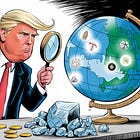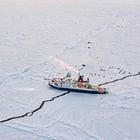The Roundup: All The Important Stories You Missed (Oct 11, 2025)
This week: The Trump Admin bets big on Arctic resources; China uses its rare earth dominance in trade negotiations; Ray Dalio is an Ocean Explorer; and Weather forecasters are big in Japan
Happy Saturday!
Welcome to another edition of the Time Machine, the roundup on weekly stories that are too important not to pay attention to.
Before we get on with our programming, I wanted to give a shoutout to MAATTR, also known as Nature Capital Trader. He is doing important and quite innovative work of helping readers connect nature and finance. Reading his work will help you understand how nature and markets collide, and where the opportunities might lie.
Miss out at your own peril - subscribe today ⏬
TL;DR:
Bigger Things:
Renewables are now bigger than Coal, globally (yay!)
From Alaska to Greenland, the Trump Administration is betting big on Arctic resources (hate to say I told you so… but I told you so)
Deals Deals Deals: Base Power and Brookfield give us a reason for optimism (we can be sustainable AND rich)
Smaller Things:
China is sticking it to the US again, expanding export controls for rare earth elements ahead of Trump-Xi talks (what can possibly go wrong🤷♂️)
New research suggests that Arctic Shipping accelerates carbon emissions (duh🤦♂️)
Data-driven weather prediction companies are now big in Japan (I’ll have an Omakase with some weather data please🍥)
Cooler Things:
Ray Dalio is now an ocean explorer (is there something you can’t do?)
The Bigger Things
The biggest stories you probably missed:
Renewables Are Now Bigger Than Coal, Globally
What Happened? Renewable energy sources, including solar and wind, overtook coal as the world’s largest source of electricity for the first half of 2025. This historic milestone was driven by China’s record-breaking clean energy buildout, massive solar cost reductions, and surging adoption in Asia and Africa, even as fossil fuel usage also increased in the US and EU due to demand and weak renewable output in some regions.
Why Care? 🤷♂️Because this report by Ember shows that despite US policy reversal, renewables are still alive and kicking, and shows no clear sign of stopping. The need to switch towards clean energy sources in the face of climate change is very much an imperative, especially as many renewables have reached price parity compared to fossil fuels.
This development joins a recently released report by the International Energy Agency that argues more than 100 countries have reduced their dependence on fossil fuels.
Trump Administration is Big on Arctic Resources
What Happened? (1) Trump Administration is considering a stake in Greenland’s Tanbreez rare earth mine to secure Arctic minerals, signaling a push to reduce U.S. reliance on China for critical metals; (2) President Trump approved a 211-mile industrial road through Alaska, reviving the stalled Ambler Access Project to enable mining operations in the region.
Why Care? 🤷♂️Because these two seemingly unrelated developments show the importance of the Arctic in the eyes of the US Administration. Rich with critical minerals, the Arctic is quietly becoming a pillar of US national security as it tries to break free from dependence on China. Climate change is making the Arctic more accessible, causing governments to accelerate their resource-extracting activities in the region.
I wrote about this here:
Deals Deals Deals
What Happened? According to Heatmap News, two recent deals bring a rare spell of good news to the clean energy community: (1) Brookfield Asset Management closed its Global Transition Fund II at $20 billion, setting a new record for clean energy investment. Over $5 billion is already deployed into renewables as global demand surges; (2) Base Power raised $1 billion in Series C funding to expand its U.S. home battery and grid-support tech, aiming to modernize America’s power grid with distributed storage solutions.
Why Care? 🤷♂️Because these deals show that clean energy is far from being dead, contrary to what many argue. Yes, there are significant headwinds, but the story is far from over. Continued investments in new sources of clean energy show that the effort to decarbonize the economy and continue the efforts to transition away from fossil fuels are still in vogue.
The Smaller Things
The stories you should have on your radar:
China Expands Export Controls on Rare Earth Elements
What Happened: China expanded its export restrictions on rare earth elements in October, adding five more metals and tightening rules for foreign users. The new controls require foreign companies using Chinese rare earths or processing technology to obtain an export license, even if no Chinese companies are involved in the end product.
Why Care? 🤷♂️Because this move, ahead of the Trump-Xi talks, shows China’s willingness to use its dominance over REE supply chain for geopolitical and trade gains. China understands that the world is becoming more reliant on REEs and is using its dominance to gain concessions.
Arctic Shipping Accelerates Carbon Emissions
What Happened: New study has scientists issue a warning that shipping traffic through Russia’s Arctic route is accelerating sea ice loss, with the research showing that year-round navigation significantly boosts regional carbon emissions and undermines global climate goals.
Why Care? 🤷♂️Because the Arctic’s reconfiguration is in full swing, it turns out. As the region warms up, new shipping routes open and with them new economic opportunities appear. However, we shouldn’t be surprised that the cost will be rising emissions and greater ice melt. Runaway climate change, here we come.
You can read more here:
Weather Forecasting Firms Are Big in Japan
What Happened: Weather forecasting companies in Japan are enjoying a boom as energy firms scramble for hyper-specialized meteorological data to gain a trading edge.
Why Care? 🤷♂️Because this is a new industry in the making. Fueled by climate change and increasingly volatile and extreme weather, energy traders need better, more granular data to hedge properly. Japan’s case is only one in a growing list of markets where climate service providers are growing in importance as a result of an increasingly violent climate. This development signals both economic opportunity for data owners and a warning sign for what’s to come.
The Cooler Things
Honestly it’s just too cool to miss out on:
Ray Dalio, Ocean Explorer
Billionaire Ray Dalio’s OceanX launched a Singapore-led research expedition to map and study the Indian Ocean’s largely unexplored Monsoon Rise, with support from scientists across Asia.
With growing interest in deep sea mining, there is a growing concern that we will literally trash the ocean and destroy marine ecosystems that we know very little about. Dalio’s new venture seeks to help us better understand the Indian Ocean in an attempt to learn more and hopefully conserve the region.
Way to go Dalio!
AI-ify the News
As always, here’s an AI-generated picture that should somehow summarize the news. Whether it’s successful or not is up to you to decide.
That’s it for this edition of News Reconfigured.
Stay tuned for my new hot take on Tuesday, and see you soon next week!
…oh, and don’t forget to subscribe - it would mean a lot! 🔽








